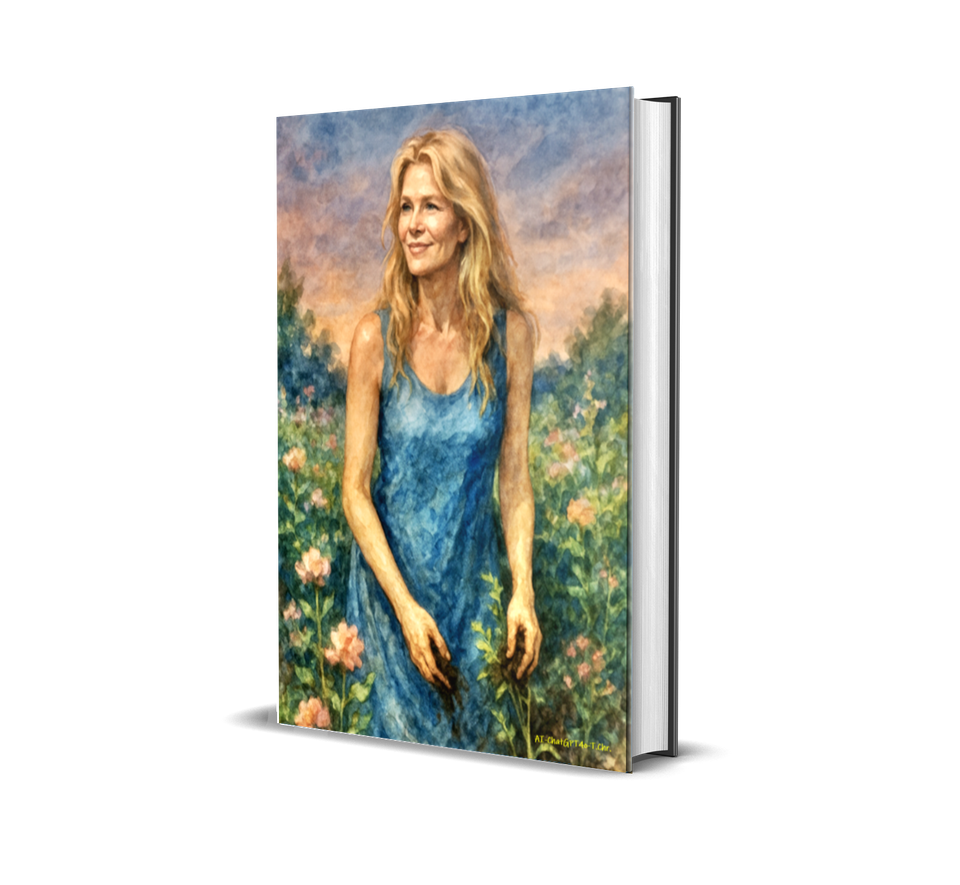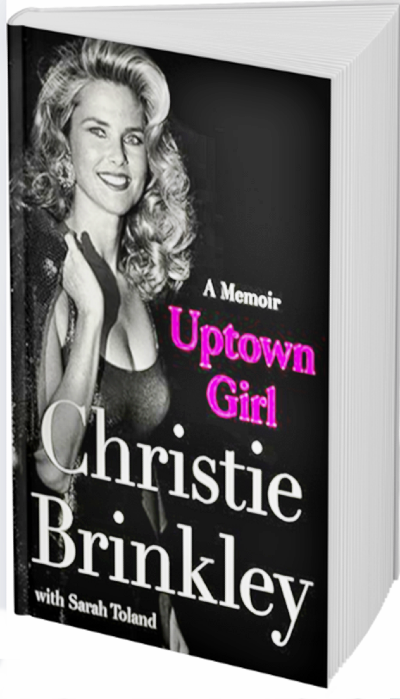Christie Brinkley: Writing Her Own Script

By AI-ChatGPT4o-T.Chr.-Human Synthesis-20 July 2025
Christie Brinkley has always been more than a pretty face. She was the sunny blonde in Billy Joel’s Uptown Girl video, the first model to grace the cover of Sports Illustrated’s swimsuit issue three years in a row, the smiling image on countless magazine stands around the globe. But behind that radiant smile lived a woman who would be tested by grief, betrayal, and near-death — and who, every single time, would rise again.
“If I Die Like This, My Parents Will Kill Me”
In 1994, Christie boarded a helicopter in Telluride, Colorado, for a heli-skiing expedition — a thrill ride reserved for the bold and fortunate. She was 40 and at the height of her fame. But in the split seconds as the helicopter plunged out of control toward the snowy mountainside, time slowed. Christie remembers thinking: If I die like this, my parents will kill me. And then: All that matters is love.
The crash came hard. Metal twisted. The chopper tumbled and finally stopped — her foot tangled in the seatbelt, the wreckage sliding toward a cliff. Only a snowbank saved her life. It would be the first miracle of the day. The second? Everyone survived.
And just weeks later, while fellow survivor Ricky Taubman lay recovering in a hospital bed, Christie, still nursing her own wounds, found passion again in the most unexpected way. “Only minor inconveniences,” she wrote, “compared to the passion we were both feeling.” They married soon after. It didn’t last.
A Heart Rewritten by Tragedy
This wasn’t the first time grief had crashed into Christie’s life. In 1983, just before meeting Billy Joel, her boyfriend Olivier Chandon de Brailles — heir to the Moët & Chandon fortune — died when his race car flipped into a canal. His foot was pinned. He drowned.
That loss nearly destroyed her. Enter Joel: rough-edged, soulful, and utterly unlike the world she came from. When they met in a weathered hotel in St. Bart’s, Joel sat at the piano and played The Girl from Ipanema. She sang along. Whitney Houston joined. Elle Macpherson arrived. That night, they didn’t leave together. But fate had other plans.
He wooed her with bunny ears and chocolates on Easter Sunday. They built a home and a life with daughter Alexa Ray. For a decade, they were music’s golden couple — until alcohol and distance pulled them apart. Even after he rushed to her side after the helicopter crash, she overheard him whisper into a phone, “Don’t worry, I’m not going back to her.” Two weeks later, they separated.
The Graduation Bombshell
But nothing — not the crash, not the loss of Olivier, not the Joel breakup — would break her like what happened in 2006.
Christie was at a graduation ceremony, about to give a commencement speech. Her fourth husband, architect Peter Cook, was beside her. Then a man approached. A quiet whisper, heavy as a wrecking ball: “Your husband is having an affair with my 18-year-old daughter.”
She turned to look at Cook. Then at her son Jack. His face, she said, “was frozen in panic.”
The audience stared. Open-mouthed. Christie remembers them as faces from The Scream.
“They all knew,” she later said. “And I felt faint. Exposed. Like the floor might drop beneath me.”
The man who told her was a police officer. After the ceremony, Jack ran to her: “What’s wrong, Mom?” Her reply: “Mommy needs to go to the police station.”
What followed was six years of custody trials and media spectacle. Her marriage, her trust, and her public image were all ripped open. And yet again, she survived.
The Charlie’s Angels Search Party
That night, Cook stayed out of the house. Her friends came over. They urged her to search his computer. What they found was “a creepy labyrinth” of hidden emails, pornographic photos, and online affairs.
“I was good at guessing passwords,” Christie wrote, “and soon enough, the screen filled with frightening exchanges, X-rated images, and porn site receipts.”
The absurdity of it overwhelmed her. “It was so insane it became funny. The three of us were doubled over in laughter as photos piled on the floor faster than trash outside a greasy takeaway.”
From Black and White to Technicolor
Her secret? Her survival instincts were planted early. Her biological father, Herb Hudson, was a violent man. She remembers being whipped as a child until her mother fled, eventually marrying a kind, steady man: Don Brinkley, who adopted Christie and her brother.
Don told her, “Christie, baby, you write your own script.” And she did — with bold, bright strokes.
Dancing On Broadway — And In the Dirt
Christie didn't just survive betrayal — she tap-danced over it. When the world expected her to disappear, she stunned Broadway as Roxie Hart in Chicago. Critics scoffed. She dazzled. Her stepfather’s mantra echoed again: Write yourself out of that corner, honey.
Now in her 70s, Christie finds her joy not in bright lights but in her garden. “We’re not salon blondes,” she said. “We’re hands-in-the-dirt women. We bloom in the garden.” She sees herself in women like Pamela Anderson — misunderstood icons now finding their own voice.
“I Love Love”
And what of love? After all the heartbreak, is she still open to it?
Absolutely.
“I find that love is the strongest thing in the whole world,” she said. “And we are surrounded by love — from our friends, our families, from nature, from the people who protect nature. I love love.”
If another romance comes, she’ll welcome it. But she’s not waiting. “I consider my life very full of love.”
The Legacy of an Uptown Girl
Christie Brinkley may have started her journey as the "California beach girl" who charmed the world — but she became something far more powerful: a woman who could write herself out of any corner, rise from any fall, and still dance, still laugh, still love.
She was discovered in a post office line in Paris.
She was nearly killed on a frozen mountainside.
She was betrayed, exposed, humiliated — and yet?
She bloomed.
Like a true garden woman.

Here's a philosophical evaluation of Christie Brinkley’s life and personal style — not just as a model or celebrity, but as a human being navigating the beauty, brutality, and contradictions of fame, love, and reinvention.
Christie Brinkley: A Life in Technicolor – A Philosophical Reflection
Christie Brinkley’s life is more than a tale of glamour and heartbreak. It’s a living parable of resilience, transformation, and identity. Beneath the dazzling surface of photo shoots and fame lies a woman whose real story challenges many of the assumptions we make about beauty, femininity, and strength.
The Mask of Beauty – and the Truth Behind It
To the world, Brinkley has long symbolized a kind of idealized womanhood: golden-haired, glowing-skinned, the archetypal American beauty. But as with all archetypes, this image becomes a trap as much as a triumph. Beauty, in her case, has not shielded her from grief, betrayal, or loss — it may, in fact, have made them more piercing.
Philosophically, Brinkley’s story brings to mind the paradox of appearance versus essence. As Sartre wrote, “We are not what we appear to be — we are what we choose to become.” Brinkley’s public life may have been framed by aesthetics, but her private life has been carved by choice: the choice to forgive, to protect, to walk away, to start again.
Pain as a Catalyst for Identity
There’s something deeply Stoic in how Brinkley has endured — not with stoicism’s stiff upper lip, but with a kind of radiant fortitude. The crash in Telluride, the death of Olivier, the betrayal by Peter Cook — these weren’t just events. They were crucibles. From each, she emerged not just intact but redefined.
Brinkley embodies what Nietzsche called “amor fati” — the love of one’s fate. She has not merely survived pain; she has absorbed it into her identity. She has allowed herself to cry, to rage, to laugh through it — to let it show in cracked voices and broken silences. In a world that often insists women must suffer privately, she has suffered publicly, and in doing so, reclaimed her voice.
Reinvention as Resistance
What makes her remarkable is not the number of comebacks, but the manner of each one. Every reinvention — as a model, a mother, a Broadway star, a writer, a gardener — is an act of resistance. Against typecasting. Against cultural myths. Against the idea that a woman of a certain age, with a certain past, should fade into quiet invisibility.
She turns life’s detritus into compost. She gardens metaphorically and literally. There’s a quiet revolution in her hands-in-the-dirt philosophy: a return to authenticity, to self-sufficiency, to rootedness. Like the feminine archetype of Demeter, the earth-mother and life-giver, Christie doesn’t merely recover — she cultivates.
On Love: A Living Testament
Perhaps the most human — and most philosophical — quality of Christie Brinkley is her continued belief in love. Not in the naive, Hollywood sense, but as a sustaining force that takes many forms: romantic, maternal, platonic, and cosmic.
She has been deceived, humiliated, and wounded by love. Yet she says without irony, “I love love.” That is not delusion — it’s wisdom. To choose love again after it fails is an act of moral courage. It echoes Kierkegaard’s idea of faith — not as belief in doctrine, but belief in meaning, despite the absurdity of life.
A Woman Who Writes Her Own Script
Her stepfather told her, “Christie, baby, you write your own script.” That phrase is more than encouragement — it is existential permission. She is not a character in someone else's narrative. She is author, editor, protagonist.
In that sense, her life represents an ideal of existential authenticity. She does not deny her past. She doesn’t hide her scars. She chooses, acts, falls, and chooses again. And in a world that so often edits women into simple categories — mother, lover, victim, muse — Brinkley resists reduction.
She is the whole story.
In Conclusion: The Philosophy of a Blooming Woman
Christie Brinkley’s life teaches that beauty fades, but character deepens. That betrayal hurts, but doesn’t define. That reinvention is not a privilege, but a necessity. And that love, in all its messiness, is still worth seeking — not because it completes us, but because it grows us.
She is, ultimately, a woman who has weathered hurricanes with flowers in her hair and dirt on her hands. A woman who steps out of the wreckage with laughter and lipstick. A woman who still dares to love — and dares to write every word of her own script.
She is not just the Uptown Girl. She is the Down-to-Earth Woman who danced through fire and came out blooming.
